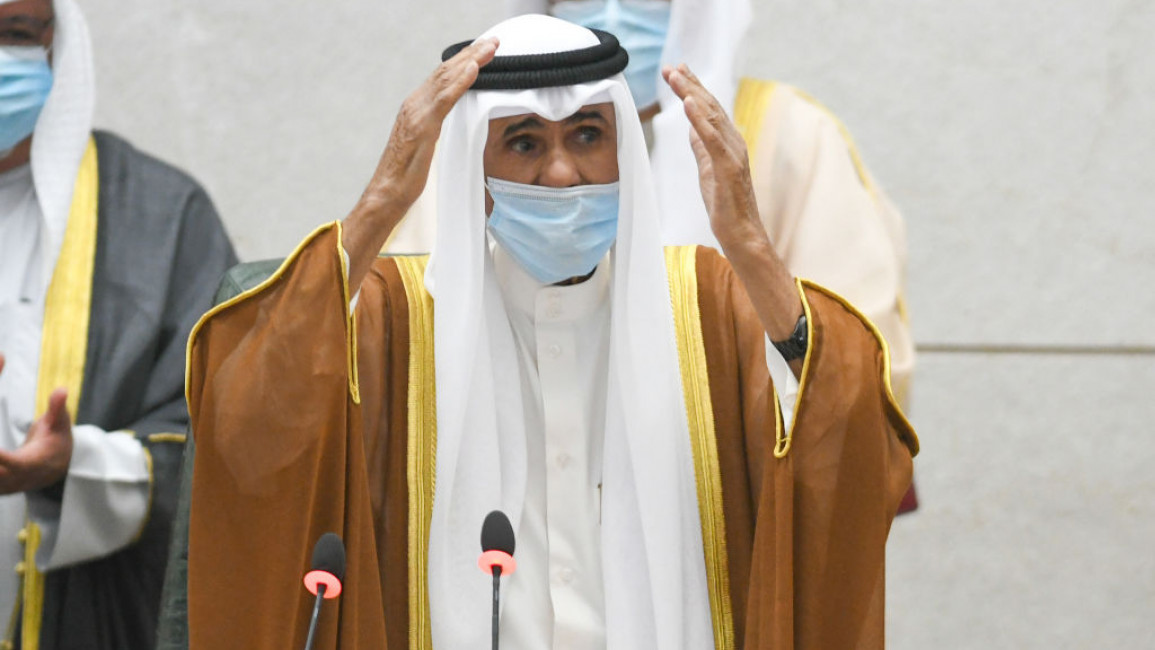Prominent Kuwaiti poet detained on charges of insulting emir
Security forces in Kuwait detained a prominent poet on charges of insulting the country’s ruler and spreading “fake news,” his family said Wednesday, inciting anger from rights activists and lawmakers who view his arrest as a sign of escalating government repression.
The poet, Jamal al-Sayer, had filled his Twitter page over the past weeks with fierce criticism of government corruption, posting lyrical verses that lament Kuwait’s dysfunction and patronage system. In one of the more incendiary tweets, he directly addresses Kuwait's emir, deploring the ruler's complicity in the “unbearable” state of the country and the government's “violating of the constitution."
In Kuwait, a nation distinguished in the region of autocratic Gulf Arab sheikhdoms for its relatively vibrant civic debate and bare-knuckle politics, authorities still vigorously prosecute the crime of insulting the country's emir, who the constitution calls “immune and inviolable."
Although Kuwait's outspoken parliament can introduce legislation and question ministers, the emir, Sheikh Nawaf Al Ahmad Al Sabah, retains ultimate authority on all state matters. Disagreements between the emir-appointed government and elected parliament frequently spiral into political crises that analysts say impede the country’s progress.
Since his arrest late Monday, al-Sayer has remained in state custody, awaiting the court's decision, said his nephew, lawmaker Muhannad al-Sayer, who had joined him at the public prosecutor's office. Authorities cited the poet's tweets when presenting the two defamation charges, he added.
Local media reported that al-Sayer denied the charges before the court. The Kuwaiti information ministry did not immediately respond to a request for comment. An official at the interior ministry declined to comment on the case.
The Gulf Center for Human Rights reported that security agents had burst into al-Sayer's home in the middle of the night. News of the raid ignited outrage from a wide range of writers, lawyers, activists and politicians in Kuwait, who revere al-Sayer as a national poet known for his tributes to a beloved homeland.
Even some pro-government lawmakers voiced their solidarity with al-Sayer, criticizing security forces for employing harsh tactics against a man in his 70s with a soft-spoken reputation and little-known history in politics.
#Free Jamal al-Sayer read one popular hashtag on Kuwaiti social media Tuesday.
“Kuwait is a constitutional state,” said opposition lawmaker Khaled al-Otaibi. “We will not accept such repressive practices, the import of totalitarian states' tactics and the culture of muzzling.”
Further alarming rights advocates, al-Sayer’s arrest comes just months after Parliament passed an amendment to the legal code that abolished pre-trial detention for those arrested for expressing their opinions or making comments online, according to the country's official Gazette.
Kuwaiti laws criminalising speech deemed insulting to Islam or the ruling family have broadened in scope since the government's social media crackdown in the wake of the 2011 Arab Spring protests.
Rights groups say that authorities seeking to quell political dissent have become increasingly empowered to arrest and interrogate activists, writers and political figures over their contentious online posts. Earlier this year, Kuwait’s constitutional court expelled the country’s most outspoken opposition lawmaker from parliament, citing an old conviction for chastising the emir.
“The continued detention of Jamal al-Sayer represents the continued bleeding of rights and freedoms from the homeland,” his nephew Muhannad wrote on Twitter, noting the generations of prominent Palestinian and Iraqi writers who sought refuge in Kuwait from government repression back home.
“The homeland that embraced their freedoms ... is now restricting the freedom of its children,” he wrote.



